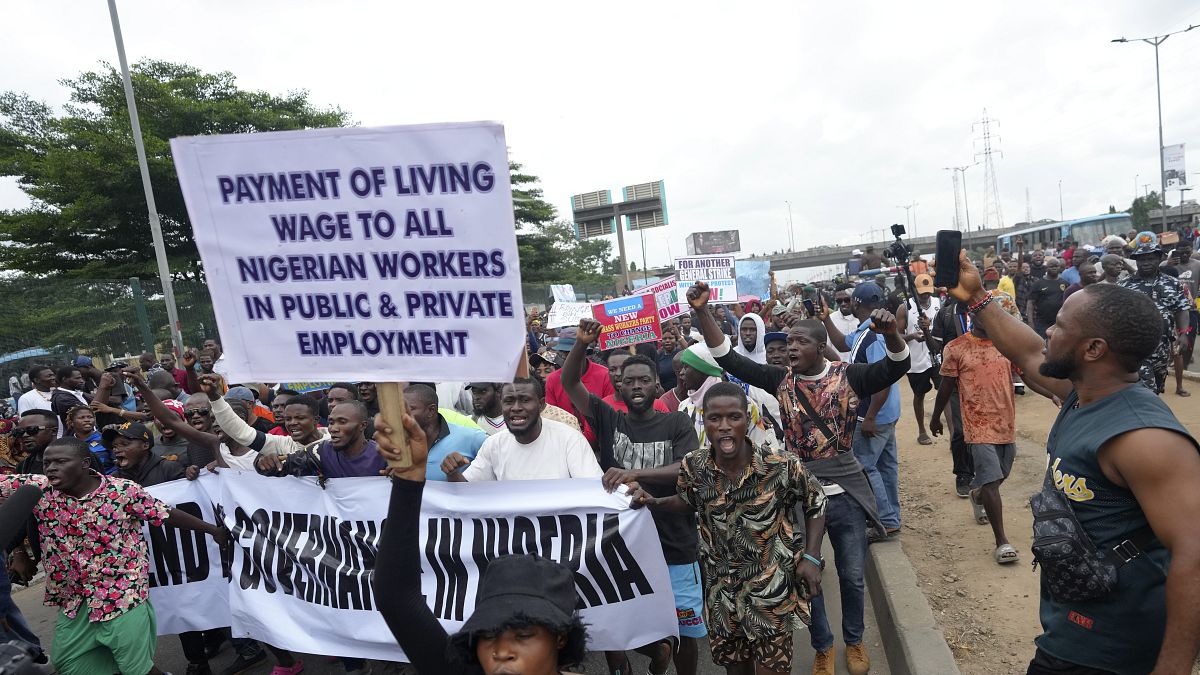Nigerian police fired tear gas at protesters in Abuja on Thursday as demonstrations broke out across the country against the escalating cost-of-living crisis. Protesters carrying placards, bells, and Nigerian flags were met with a heavy security presence on the streets of the capital, with police resorting to using tear gas to disperse the crowds. Despite a court order restricting the protest to a stadium, protesters gathered in a district with government offices faced repeated tear gas attacks from the police.
Nigeria, one of the top oil producers in Africa, is currently in the grip of one of the worst cost-of-living crises in a generation. This crisis is exacerbated by the stark contrast between the well-paid public officials, often accused of corruption, and the large population of impoverished and hungry citizens. The disconnect between the wealthy elite and the struggling masses has fueled public anger and frustration, leading to widespread protests across the country. The use of tear gas by the police highlights the government’s aggressive response to the growing unrest.
The protests in Nigeria are not limited to Abuja, as demonstrations have erupted in various parts of the country. Roads have been blocked by both protesters carrying banners and armed security forces deployed to maintain order. The scenes of unrest and police crackdowns underscore the deepening economic and social challenges facing Nigeria. The combination of high inflation, rising cost of living, and widespread poverty has pushed many Nigerians to the brink, sparking a wave of public protests and expressions of discontent.
The current cost-of-living crisis in Nigeria is a reflection of the systemic issues plaguing the country, including corruption, mismanagement of resources, and a widening wealth gap. While Nigeria boasts abundant natural resources, including oil, mismanagement and corruption have hindered the country’s development and contributed to widespread poverty. The government’s response to the protests, as seen in the use of tear gas and heavy security presence, suggests a reluctance to address the root causes of the crisis and instead resort to heavy-handed tactics to suppress dissent.
As the protests continue to escalate and spread across Nigeria, the government faces mounting pressure to address the underlying issues driving the unrest. The use of tear gas and other forms of repression only serves to inflame tensions and further alienate the population. A more sustainable solution to the cost-of-living crisis would require meaningful reforms, transparency, and accountability from the government. By addressing corruption, promoting inclusive economic policies, and prioritizing the needs of the most vulnerable, Nigeria can begin to address the root causes of the crisis and pave a path towards a more equitable and prosperous future for all its citizens.
In conclusion, the protests in Nigeria against the cost-of-living crisis highlight the deep-seated issues of corruption, inequality, and economic hardship that continue to plague the country. The government’s response to the unrest, marked by the use of tear gas and heavy-handed tactics, only serves to exacerbate the tensions and deepen the divide between the ruling elite and the marginalized populations. Addressing the root causes of the crisis through meaningful reforms and inclusive policies is essential to building a more just and equitable society for all Nigerians. As the protests continue to unfold, the world watches to see how Nigeria will navigate this challenging period and work towards a brighter future for its citizens.










